Eric Rohmer Centennial: Six Moral Tales
 Saturday, April 11, 2020 at 10:45AM
Saturday, April 11, 2020 at 10:45AM by Eric Blume
 Last weekend marked the 100th birthday of one of France’s greatest directors, Eric Rohmer, and we here at TFE figured that a nice way to celebrate him would be a look back at the six-film series that launched his career, the Six Moral Tales, which were released between 1962 and 1972.
Last weekend marked the 100th birthday of one of France’s greatest directors, Eric Rohmer, and we here at TFE figured that a nice way to celebrate him would be a look back at the six-film series that launched his career, the Six Moral Tales, which were released between 1962 and 1972.
These films basically have the same plot: a man obsessed or in love with one girl finds himself distracted by another woman, only to return to the first girl. Rohmer uses this framework to examine the stunted male psyche, the rationalizations of behavior, and the mystery of love...
These films are both dated and timeless, tricky to watch in this cultural climate, as the men make all the decisions here. But it’s exactly within this context that the films hold a deep fascination.
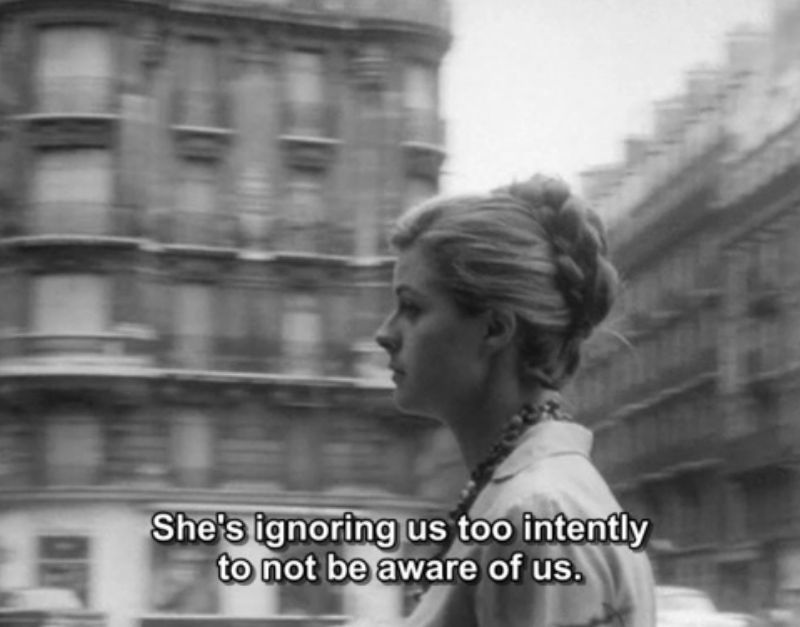
Rohmer purposefully puts us in a situation in these films where the female character we see the most and identify with is cast aside, or has an unknown resolution. We’re rarely “happy” to see the reunion with the original woman, because we’ve barely seen her, or we don’t know her. Often, these films are about how the lead male character makes his choice exactly because he can’t handle being truly challenged by the second woman. These men all hold to their own “moral code” which allows them to claim integrity while their actions are selfish and feckless.
The first two films are shorts. The Bakery Girl of Monceau, at 23 minutes, is the perfect entrée into the Rohmer world, and plays incredibly well. Our lead man is played by Barbet Schroeder, who produced all of Rohmer’s early films, and of course went onto his own Oscar nomination for directing Reversal of Fortune many years later. The second, Suzanne’s Career, feels overextended at just under an hour. This film feels plodding, and Rohmer was still at this point working with friends of Schroeder’s rather than trained actors, so there’s not much magnetism in what we’re seeing, and you feel the schematic.
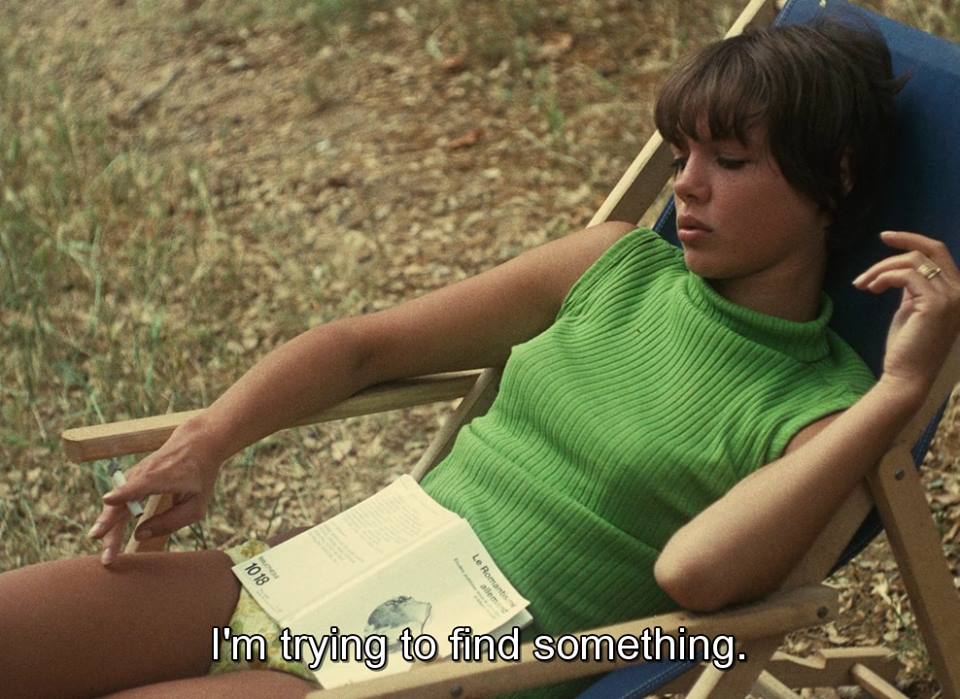
The third film in the series, La Collectionneuse, feels like the transitional movie in the series. Rohmer’s characters here feel more fleshed out, but once again, he doesn’t have great actors who are able to fill in the gaps of the character’s behaviors, which are quicksilver transitions full of gameplay and push-and-pull. The whole film doesn’t quite land, but you can see Rohmer start to explore the possibilities of the camera here, and conceits that felt more on the literary side begin to find a cinematic equivalent here.
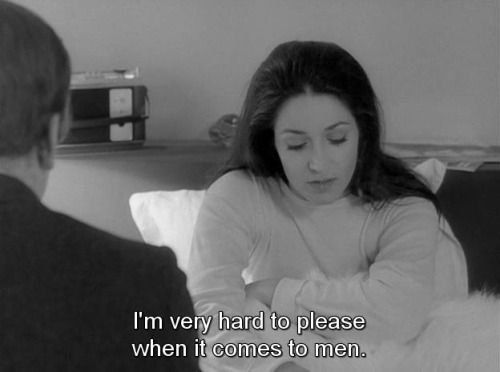
The fourth film, 1969’s My Night at Maud’s, was the breakthrough for Rohmer: it was even nominated for an Oscar for Best Original Screenplay in addition to Best Foreign Film (it lost to Costa-Gavras’ great Z, by the way). This film basically serves as a model for what Americans began to think of as a “French film”: intellectual characters having long discussions about ideas, from religion to fidelity to identity. The influence of this film can’t be underestimated. Rohmer was unafraid to hold an audience with little more than long, sharply-written scenes between two or three actors playing the love game. At the center of Maud is a thirty-minute set piece between the two main characters that’s jammed with seduction, resistance, hesitance, and false justification. It works because finally Rohmer had two actors, Jean-Louis Trintignant and Francoise Fabian, who deeply understood subtext and took the film beyond a series of ideas and into something fully flesh-and-blood: Trintignant captures all of his character’s pompous contradictions, and Fabian creates Rohmer’s first fully-drawn female character, complete with a breezy humor that shows she’s nobody’s fool.
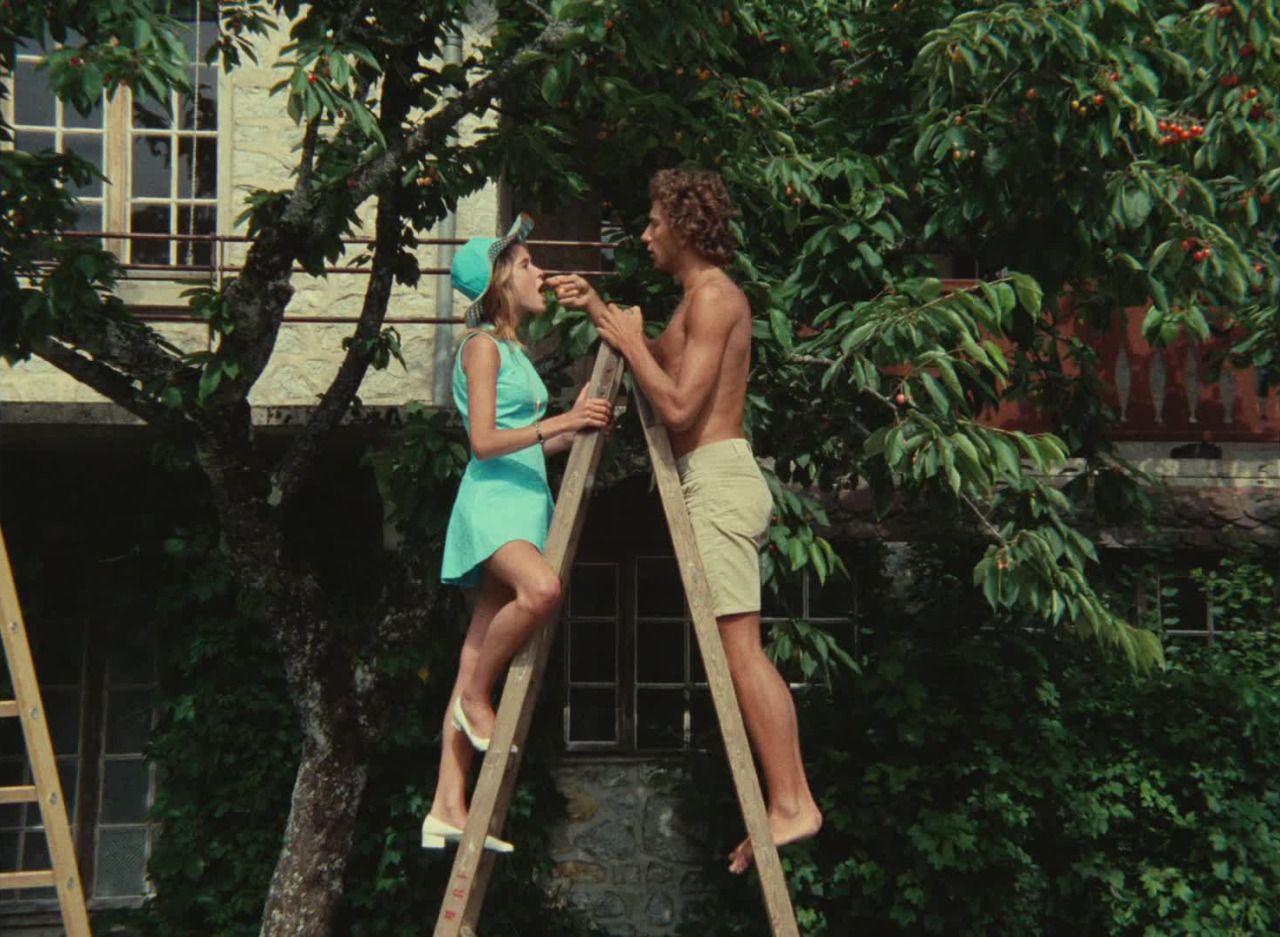
Rohmer’s fifth chapter, Claire’s Knee, is arguably the most famous but also his most problematic. It’s hard not to get the ick from this film today, as it’s tough to watch the lead character (Jean-Claude Brialy) seduce a 16-year-old, get weirdly handsy with an old flame, and emotionally manipulate another young girl while he’s a month away from his marriage. While the issue of this kind of “morality” is EXACTLY what Rohmer is trying to address, how men rationalize atrocious behavior, this is the one film that seems to cross the line by contemporary standards. The lead character (and actor) just feels…gross. When the eponymous knee is touched by our lead character, it no longer feels poetic or erotic or shocking, but just rapey. I fully “get” what the movie is up to, but I’d argue it doesn’t play very well nowadays.
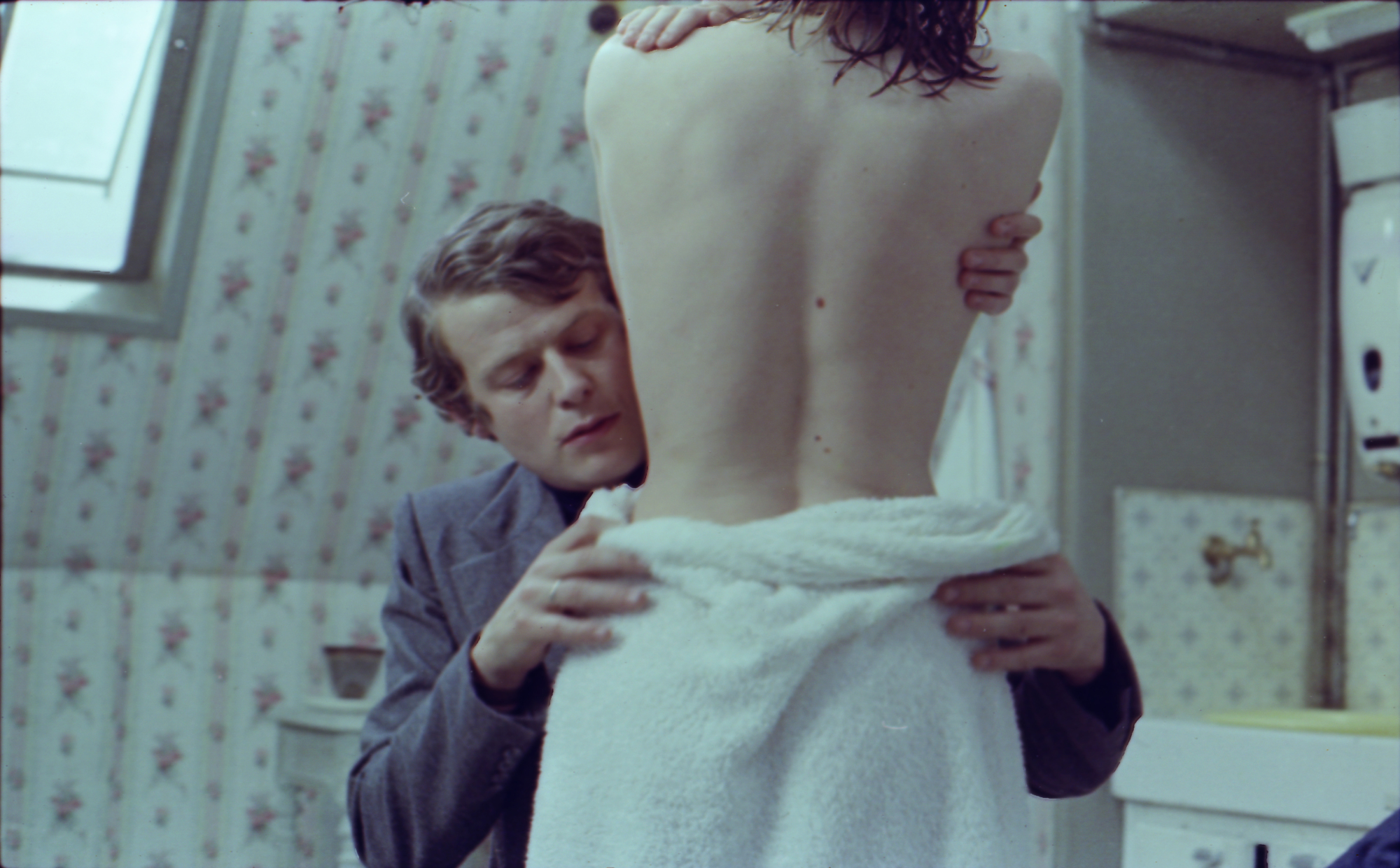
Male privilege is once again the subject in the final tale, 1972’s Love in the Afternoon. Rohmer pushes the envelope farther here, as it’s his first male protagonist to be married, and his series of “moral compromises” throughout the picture culminate in a powerful winner of a surprise ending, as Rohmer shows us the limitations of how men think. This film’s female protagonist, played by model Zouzou in full foxy hippie mode, has a refreshingly dangerous edge that puts Rohmer’s issues in a slightly new light. The movie is also a howl to watch as it’s a 1970’s time capsule of Paris in terms of costumes, locations, and typewriters.
In these six films, Rohmer set up the universe for all of his films to come. As he grew as an artist, he expanded beyond this almost unrelenting examination of male privilege, and his female characters began to have lives of their own outside of the male gaze. He also gained a greater lightness in his approach in his later films. These six films are remarkably subtle, almost to the point of being misunderstood as sexist or misogynist. But Rohmer’s target was absolutely the rationalizations that men make to get through life and justify their actions, and how words are used as armor, castle, and moat to keep out the actual reality beyond the walls. It’s easy to see why Eric Rohmer has long been considered one of the cinema’s greatest filmmakers. If you only have time for one of these, catch My Night at Maud’s, which despite a bit of tedious Catholicism, makes its points with the greatest skill, and leaves the longest linger.
These films are currently streaming on the Criterion Channel



Reader Comments (8)
I am alarmed to say that I've never seen any of these. My first Rohmer was PAULINE AT THE BEACH (which I liked quite a lot). and weirdly the only other ones I've seen were two of his last three pictures LADY AND THE DUKE and THE ROMANCE OF ASTREA AND CELADON neither of which I enjoyed.
A lot of these I find tedious, but I love "My Night at Maud's" and "La Collectionneuse" is better than you're giving it credit for. I guess stories of *amour mal* aren't really my bag, although some of Rohmer's later work I like a lot more (especially "A Summer's Tale").
Oh, I love Eric Rohmer but I am more familiar with the ones that come after these. I THINK I've seen Love In The Afternoon? At least I remember an office where all the men seemed to just use the women who passed by as playthings.
I have definitely seen Claire's Knee more than once and I would argue that it actually does work, despite the ick factor. In fact, I think it works possibly better now because it's kind of icky. It's easier to see that the leading man is kind of a skeevy douchebag now instead of the hippie-ish free love kind of guy he was supposed to be back when it came out. Plus, who doesn't want to live on a lake and commute by boat while going shirtless all summer?
My Night At Maud's I have tried to watch a couple of times but keep getting distracted. Maybe it's because I cannot interest a single person in seeing it with me, and I am too shallow to get through all the talkiness while watching it on the sofa? I think I need to be forced to see it on the big screen so my "buy in" is strong enough to keep me there.
I finished the Six Moral Tales last year finally as it is an incredible series as I'm in awe of the works of Eric Rohmer though I think My Night at Maud's is the best of the bunch and my favorite film of his that I've seen so far.
Rohmer is such a brilliant director and his Six Moral Tales are wonderful. He was the master of having a benign surface overturned by minute conversations, gestures and actions. He sees his characters through a microscope and it's thrilling for us, spectators, to watch them unravel their inner turmoil while also trying to keep a calm facade.
What a coincidence. i just watched these last month when my LA vacation was cancelled due to the shelter in place. The 6 had been on my to do list for a while as I have enjoyed a lot of Rohmer in the past (Full Moon in Paris, Pauline at the Beach, Autumn Tale in particular). i enjoyed the 6 .. though maybe found the second one a bit thin and tedious for the reasons outlined in this piece. I enjoyed most Claire's Knee and Love in the Afternoon. My Night at Maud's was fine, but maybe my expectations were too high. The Catholicism and Pascal talk got a bit much after a while. But at least there was a lady pediatrician!! And the ending was very good. In fact, most of these endings were good in this series.. even the tedious Collectioneuse. Regarding Claire's Knee: man, despite the set up, i really wasn't prepared for how intimate (and violating) that simple knee caress would be. Just a fantastic set up and sequence all around. Bravo.
The young Jean-Louis Trintignant is so gorgeous that it just warms my heart that he is also a fantastic actor.
And it was fun to see his ‘My Night at Maud’s” co-star, Francoise Fabian in the French tv series “Call My Agent” (available on Netflix and perfect for current viewing).
Rohmer is a filmmaker I really love, and I founded a bit odd that there were not a special mention in this site some weeks ago for his 100th anniversary, so many thanks Eric for your text, I really liked it! I only have seen two of his Six Moral Tales, "My Night at Maud's" and "Claire's Knee", I liked both of them very much, even if I prefer even more some of the other Rohmer later films, like "The Green Ray", "Pauline at the Beach" and specially "A Summer's Tale" and "Autumn Tale". I can understand that his cinema was not everyone's cup of tea, but deffinitely I love his movies, and his influence is very easy to find in directors as Woody Allen, Richard Linklater, Noah Baumbach, Hong Sang-soo or more recently Ira Sachs in "Frankie".